Poll
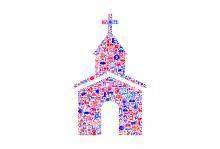
A LOT HAS BEEN written in recent months about how Christian nationalism is a threat to America — and of course that’s right. But it’s also worth noting that it’s a threat to Christianity.
This round of concern really took off when a new poll from the Public Religion Research Institute (PRRI) found that alarming numbers of people believed things such as “the U.S. government should declare America a Christian nation” and “God has called Christians to exercise dominion over all areas of American society.” Nearly 30 percent of Americans mostly agreed (sympathizers) or completely agreed (adherents) with such statements, which is scary enough — but among Republicans that number rose to 54 percent, which means it is the dominant belief system among one of the two parties that frequently swap control of the U.S. government.
PRRI President Robert P. Jones defines Christian nationalism as “the idea that America is destined to be a promised land for European Christians.” Nearly two-thirds of white evangelical Protestants, according to PRRI, qualify as adhering or sympathizing with this belief. Astonishingly, these beliefs cross racial lines. “White (29%), Hispanic (25%), and Black (20%) Christians who identify as born-again or evangelical are each about five times as likely to be Christian nationalism adherents as members of the same racial or ethnic groups who identify as Christian but not evangelical,” the institute reports.

“Nine times out of 10, we’ll just be greeting people and passing out water and snacks,” said Billy Michael Honor, who directs Loose the Chains, the faith engagement initiative of The New Georgia Project “But in the event that something does happen, it’s good to have people there who know how to lead people in situations of conflict or crisis.”

Despite the region’s widespread secularization, 71 percent of the 24,599 adults Pew surveyed in 15 countries still identify as Christians, even if only 22 percent say they attend church at least once a month.

"It always requires two people, two separate actions, to launch, steal, sabotage, or tinker with an atomic warhead," Peter Zimmerman, nuclear physicist and State Department consultant wrote for USA Today. "This is the inviolable two-person rule intended to prevent misuse of a nuclear weapon."

China is experiencing “one of the great religious revivals of our time,” Johnson writes. “Across China, hundreds of temples, mosques, and churches open each year, attracting millions of new worshippers. … Faith and values are returning to the center of a national discussion over how to organize Chinese life.
“This is not,” he continues, “the China we used to know.”
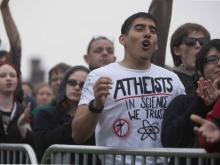
A new study shows there may be more than twice as many atheists in the U.S. than previous studies have found.
The report by two University of Kentucky scholars suggests that because people may be embarrassed to admit they don’t believe in God, the number of Americans who say they are non-believers may be artificially low. Polls from Gallup, Pew, and Barna have reported that number between 3 and 10 percent.

For the first time, a majority of Americans has voiced concern about violence against Jews, polling by the Anti-Defamation League shows.
While 52 percent of Americans surveyed said they are disturbed about such violence, an even higher percentage — 76 percent — said they are concerned about violence against Muslims.
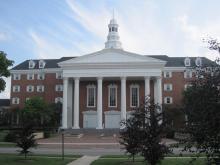
Exit polls suggest 81 percent of white evangelicals voted for President-elect Donald Trump.
But support for Trump may have been less decisive on Christian college campuses, where most students are also white evangelicals.
A Washington Post/ABC News poll, before the election, found the views of younger adults do not align with some older ones, when it comes to their beliefs about Trump supporters.
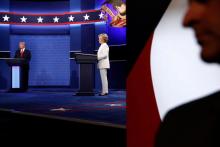
For some, the choice is not clear. Clinton-Kaine may be the more personally religious ticket, but Trump-Pence is more cozy with the religious right, aka the evil empire among atheists. Then there’s Green Party candidate Jill Stein, who has no chance of victory, but is the only candidate who reached out to nonbelievers and asked for their vote.
So what’s an atheist to do?
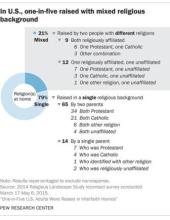
The poll, conducted by the Pew Research Center, also found that, of those raised this way, most had one Protestant, or Catholic parent, and one religiously unaffiliated — sometimes called a “none” — parent.
“To be sure, religiously mixed backgrounds remain the exception in America,” the report on the poll states. “But the number of Americans raised in interfaith homes appears to be growing.”
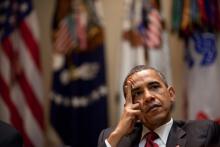
Despite a Hawaii birth certificate and repeated professions of his Christian faith, fairly large numbers of Americans still believe President Obama is a Muslim born outside of the United States.
True, 80 percent of Americans do believe Obama was born in the U.S., according to a new CNN/ORC poll, but 20 percent do not.
Of that total, 9 percent claim there is “solid evidence” Obama was born elsewhere, while another 11 percent said it is just their suspicion, CNN reported.
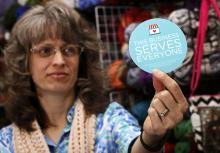
A host of governors, CEOs, and church leaders call Indiana’s new religious freedom law a backdoor opening to anti-gay discrimination, but Americans appear more divided on whether a wedding-related business should have the right to turn away a gay customer.
The law, which critics say would allow owners of small businesses to invoke their faith to refuse service to LGBT customers, applies most apparently to wedding vendors — bakers, photographers, and florists, for example — who cite their faith in opposing same-sex marriage.
Where is the American public on this debate? It depends on how the question is asked.
A February Associated Press poll found that 57 percent of Americans believe a wedding-related business should have the right to refuse service to a gay couple on religious grounds, as opposed to nearly 4 in 10 Americans (39 percent) who said that religious exemption — which Indiana’s new law explicitly allows — is wrong.
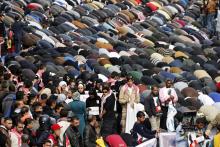
More than a quarter of Americans and nearly half of senior Protestant pastors say the Islamic State terrorist group offers a true representation of Islamic society, according to a pair of new surveys by LifeWay Research.
The findings that indicate many Americans have a dim outlook on Islam come as President Obama sent a formal request to Congress on Feb. 11 to authorize the use of military force to combat the Islamic State. Meanwhile, police in North Carolina tried to determine whether the shooting deaths of three Muslim students were hate-motivated.
Forty-five percent of 1,000 senior Protestant pastors surveyed say the Islamic State, also known as ISIL or ISIS, “gives a true indication of what an Islamic society looks like.” Forty-seven percent disagreed with the statement, according to LifeWay, a Nashville-based, non-profit Christian research group. LifeWay surveyed only clergy who identified themselves as the top pastoral officials in their organizations.
The pastors had a much darker view of Islam than Americans at large.

WITH THE CRUCIAL midterm elections less than a fortnight past, many Americans are wondering what “fortnight” means, because it sounds really cool on Downton Abbey. Well, it means two weeks, and that’s hardly enough time to develop the regret appropriate to the choices you made at the polls.
But why wait for that inevitable sinking feeling about your latest destructive act against democracy? Let’s get a jump start on your anxiety by reading through a recent poll asking Americans how Jesus would weigh in on issues of the day.
Let the disappointment begin.
As a devout Christian—you can put down your American flag, we know who you are—you regularly ask yourself, “What would Jesus do?” And who better to advise you than Jesus himself, or the best representation of God’s son that modern technology can provide: the telephone survey.
You know, that thing that happens when you’ve just sat down to eat dinner after already getting up twice, once for the cracked pepper you forgot and again to replace the bent fork that you always seem to end up with. Then you finally start to say grace AND THE DARN PHONE RINGS!! (Jesus calls us to follow him. The survey guy calls us at dinner time.)
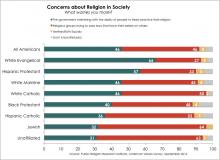
These are anxious times for white evangelicals, according to two new surveys.
At 20 percent of U.S. adults, they are statistically neck-and-neck with the “nones” — people who claim no religious brand. “Nones” now tally up to 19 percent in the 2014 American Values Survey, said Robert Jones, CEO of the Public Religion Research Institute, which released the survey Sept. 23.
Evangelicals, said Jones, are on “the losing side of the culture wars, such as gay marriage, and they see that their share (of society) is shrinking and aging, adding to their sense of being embattled.”
“They can no longer say confidently they speak for all people of faith.”
Perhaps for that reason, white evangelicals, more than any other religious group, worry that the government will interfere with their religious liberty.
The survey asked which concerned people more: The government interfering with their ability to “freely practice their religion” or “religious groups trying to pass laws that force their beliefs on others.”
The overall answer was a tie — 46 percent of Americans overall for each viewpoint. But white evangelicals were significantly more worried about government interference (66 percent) than any other group.

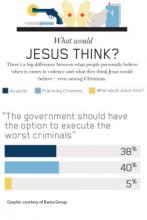
One day after the state of Ohio executed a man for murder, a new poll shows younger Christians are not as supportive of the death penalty as older members of their faith.
When asked if they agreed that “the government should have the option to execute the worst criminals,” 42 percent of self-identified Christian boomers, born between 1946 and 1964, said “yes.” Only 32 percent of self-identified Christian millennials, born between 1980 and 2000, said the same thing.
The poll conducted by Barna Group this past summer and released to Religion News Service Friday, surveyed 1,000 American adults and has a margin of error of plus or minus 2.6 percentage points.
It showed an even sharper difference in support for the death penalty among “practicing Christians,” which Barna defined as those who say faith is very important to their lives and have attended church at least once in the last month. Nearly half of practicing Christian boomers support the government’s right to execute the worst criminals, while only 23 percent of practicing Christian millennials do.
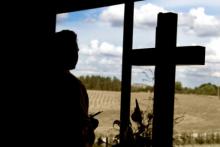
Clergy used to rank near the top in polls asking Americans to rate the honesty and ethics of people in various professions. This year, for the first time since Gallup began asking the question in 1977, fewer than half of those polled said clergy have “high” or “very high” moral standards.
But opinions on clergy differed markedly by party, with Republicans viewing them far more favorably than Democrats.
Overall, 47 percent of respondents to the survey gave clergy “high” or “very high” ratings, a sharp drop in confidence from the 67 percent of Americans who viewed them this way in 1985.

The news that immigration reform may be dead—at least for this year—isn’t likely to sit well in many of America’s churches.
A new poll from Nashville-based LifeWay Research finds nearly six in 10 senior pastors of Protestant churches support immigration reform that includes a path to citizenship.
Many of those pastors hope reform will help them minister to more Hispanic Americans. But few say the current immigration system hurts current members of their flocks.
The poll of 1,007 senior pastors of Protestant churches, conducted Sept. 4-19, comes as immigration reform has stalled on Capitol Hill.
The Islamic political party known as the Muslim Brotherhood has soured American attitudes towards Egypt, arguably America’s most important Arab ally, since its candidate Mohamed Morsi won presidential elections there in June 2012.
That’s according to a poll released Friday by the Arab American Institute in Washington, D.C.
Morsi’s term has been dogged by charges that he opts for authoritarian measures such as martial law. Muslim-Christian clashes have also shadowed his term; there were clashes on April 5 in the town of Khosus that killed four Coptic Christians and one Muslim, and violence also marred the April 7 funeral for the Copts who were killed in that conflict.
According to the Institute’s poll of 2,300 likely voters, only 36 percent of Americans had favorable views of Egypt, down from 66 percent in 1997. At least some of the decline has been attributed to the Muslim Brotherhood, which won Egypt’s parliamentary elections in January 2012, and to Morsi himself, who won the presidency last June by a 52-48 percent margin.